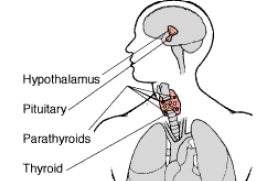1. Pituitary Gland
This is a pea sized major endocrine gland. It is protected by a boney cavity called Sella turcica of the sphenoid bone. It is a protrusion of bottom of Hypothalamus at the base of the brain. This gland is also called as Hypothesis.
Pituitary secretes many hormones that control the functioning of various organs and glands of the body. Some of the hormones secreted by this gland control the secretion of other glands. Due to this specific characteristic feature this gland is called as Master Gland.
Hormones secreted by Pituitary gland and their functions
Pituitary secretes different hormones like Growth Hormones or the Somatotropic Hormones, Adrenocarticotropic Hormones, Gonadotropic Hormones (GTH), Follicle Stimulating Hormone (FSH), Latinizing Hormone (LH), Thyroid Stimulating Hormone (TSH) or Thyrotrophic Hormone, Lactogenic Hormone (LH), Antidiuretic Hormone or Vasopressin (ADH) and Oxytocin.
Growth Hormone controls growth of bones. It is secreted before puberty. It causes an abnormal increase in body length. This condition is called as gigantism. If this hormone is secreted in excess after puberty it causes Acromegaly which leads to very fat or bulky bodies of girls. Breasts and hips under this condition grow abnormally and voice becomes heavy.
If the secretion of STH stops before puberty, it causes dwarfism.
Adrenocarticotropic hormone or ACTH controls the secretion of adrenal cortex. Gonadotropic hormone controls secretion of sex hormones in testes and ovaries. This hormone is of two types-
(a) Follicle Stimulating Hormone (FSH) which activates follicle of ovary that leads to its growth,
(b) Luteinizing Hormone (LH) activates synthesis of Estrogen in females and Testosterone in males.
Thyrotropin or Thyroid Stimulating Hormone (TSH) activates thyroid and increases its synthesis. Lactogenic Hormone causes lactation in females after child birth.
Anti-diuretic hormone or Vasopressin (ADH) keeps a balance in our body. Misbalance of this hormone in our body causes diabetes insipidus or excessive urination. Though excessive urine is formed in this disease; presence of glucose is not essential.
Oxytocin is helpful in contraction of uterine walls after child births. It also activates milk secretion in mammary glands. This is also called as birth-hormone.
2. Thyroid Gland
It is a large ductless gland found in the neck. It secretes hormones that regulate growth and development.
Thyroid gland is situated in the front (anterior) neck below the ski of muscles. The shape of this gland is similar to that of a butterfly with the two wings being represented by the left and right thyroid lobes that wrap around the trachea.
Thyroid gland secretes a hormone called as Thyroxin. Iodine is essential for the secretion of this hormone. Hence, it is advised to take iodized salt. A long term deficiency of iodine in food causes a deficiency disease called as Goiter.
Functions of Thyroxin Hormone
(i).This hormone is essential for the general growth of the body,
(ii).This hormone controls the metabolism of carbohydrate, protein and fat,
(iii).This hormone controls the percentage of intercellular fluid of tissues,
(iv).This hormone is essential for the muscle of heart and the activities of the Central Nervous System.
Diseases caused due to malfunctioning of Thyroid
(i). Synthesis of thyroxin in less than desired amount causes cretinism in children. Following abnormalities occur as symptoms of cretinism –
(a).Children attacked by cretinism in childhood behave like a child even when they grow adult,
(b).In such case physical and mental development is stopped for the whole life,
(c).The external genital organs of a person does not develop if he is struck with cretinism in his childhood
(d).The deficiency of thyroxin after puberty causes Mixidema in the adulthood. This disease is characterised by a Low Blood Pressure with low heart rate.
Parathyroid Gland
There are four small glands in the neck area attached to thyroid gland. These small glands are called as parathyroid gland. These glands secrete parathyroxin which is a hormone essential for the calcium metabolism.
This hormone controls the quantity of calcium in the bones and blood. The level of calcium in blood increases due to increase in the secretion of this hormone. It gets deposited as stone on kidney. It adversely affects the kidney function.




